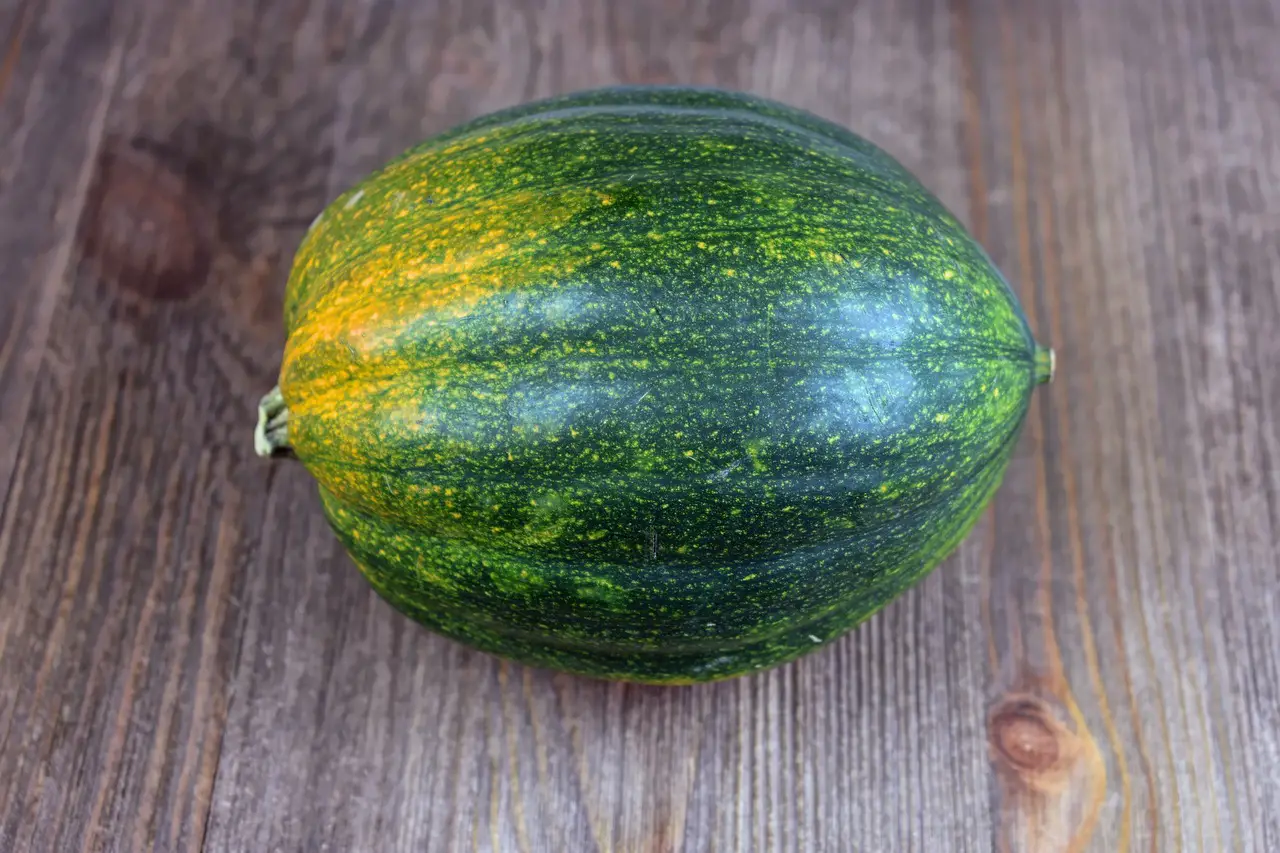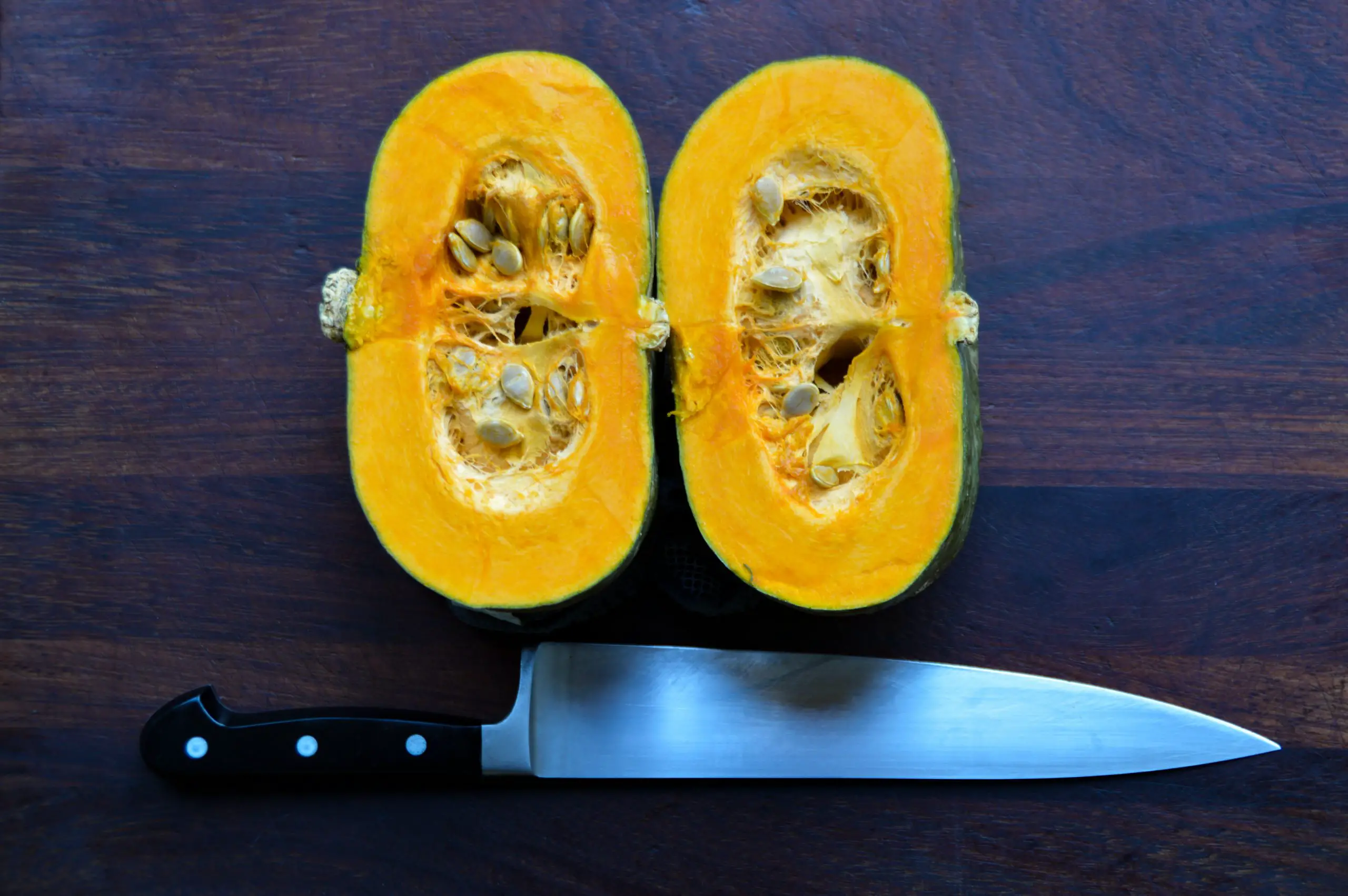Acorn squash is a popular winter squash variety that produces a sweet and nutritious fall vegetable that can be used in various dishes. It is a good source of vitamins and minerals and is commonly used in soups, stews, and baked dishes. If you have an excess of acorn squash or want to have some on hand for future use, you can freeze it.
Freezing acorn squash is a simple process that preserves the squash’s flavor and nutrients while saving you time and money. Freezing acorn squash is a quick and easy way to keep it fresh and flavorful while saving time in the kitchen. This article will show you how to freeze acorn squash so you can enjoy it all year round.

How to Freeze an Acorn Squash?
Acorn squash is fairly simple to freeze. It is not skin that is smooth and simple to peel. Not skin that is smooth and simple to peel. The ribs of acorn squash ar squash can be preserved to retain their nutrients and flavor for further use.
To freeze acorn squash, follow these instructions:
- Wash the Squash: First, clean the acorn squash with cold running water to remove any contaminants or dirt.
- Cut the Squash: Cut the acorn squash into small 1-2 inch pieces. This will make blanching and freezing the squash easier.
- Blanch the Squash: To blanch the squash, bring a pot of water to a boil and add the squash pieces. Boil the squash for three minutes, then transfer it to a bowl of ice water using a slotted spoon. This will halt the cooking process and help to preserve the squash’s flavor and nutrients.
- Drain the Squash: Once it has cooled, drain it thoroughly to remove any excess water.
- Pack the Squash: Place the squash in a plastic bag or container, leaving enough room to expand as it freezes. Alternatively, place the squash in a single layer on a baking sheet and freeze until solid, then transfer the frozen squash to a plastic bag or container.
- Label and Freeze the Squash: Place the bag or container in the freezer and label it with the date and contents. Acorn squash can be frozen and stored for months.
Can you Freeze Raw Acorn Squash Without Blanching it?
It is possible to freeze raw acorn squash without blanching it, but it is not recommended. Blanching is briefly boiling or steaming vegetables before freezing them to inactivate enzymes that can cause the vegetables to become mushy or lose flavor and nutrients over time. While blanching adds an extra step to the freezing process, it is worth it for frozen vegetables’ improved quality and longer shelf life.
If you freeze raw squash without blanching it, the quality of the squash may deteriorate over time, resulting in a softer texture and potentially off flavors. Because of bacteria and enzymes, the squash may be more susceptible to spoilage.
As a result, I blanched the squash before freezing, ensuring the best quality and the longest shelf life. This can be accomplished by cutting the acorn squash into small pieces, boiling it for three minutes in a pot of water, and then plunging it into a bowl of ice water to stop the cooking process. After that, drain the acorn squash and place it in a plastic bag or container before freezing it.
Is it Required to Peel Acorn Squash Before Freezing it?
Peeling acorn squash before freezing is optional, but it may be a good idea, depending on how you intend to use it after it has been thawed. Acorn squash has tough, inedible skin that must be removed before eating. However, the skin can also help to protect the squash during the freezing process by preventing the texture and flavor of the squash from deteriorating.
If you intend to use the frozen acorn squash in dishes where the skin will be removed before cooking, such as soups or stews, peeling the squash before freezing may be the easiest option. This saves time and effort in peeling the squash after it has been thawed and allows it to cook more evenly.
However, if you intend to use the frozen acorn squash in dishes where the skin will be left on, such as roasted acorn squash, it may be best to leave it on before freezing it. The skin will help to protect the texture and flavor of the squash during the freezing process, and it can be easily removed after the squash has been defrosted and cooked.
Whether you peel the acorn squash before freezing depends on your preferences and how you intend to utilize it once it has been thawed, if you’re undecided, it might be a good idea to test both approaches and determine which suits you the best.
Is Frozen Acorn Squash as Good as Fresh Acorn Squash?
While frozen acorn squash is a convenient and cost-effective way to enjoy this nutritious vegetable all year, fresh acorn squash is different. The texture is one of the primary distinctions between fresh and frozen squash.
Fresh acorn squash has a firmer, crisp texture, whereas frozen acorn squash is softer and slightly mushier. This is because the acorn squash cells are damaged during the freezing process, which can affect the texture of the acorn squash when it is thawed.
Fresh and frozen acorn squash may have slightly different flavors. This is because the flavor compounds of the acorn squash can change during the freezing process, and the squash may absorb the flavors of other foods stored in the freezer.
Regardless of these distinctions, frozen acorn squash can be a tasty and nutritious addition to your diet. It can be used in various dishes, including soups, stews, casseroles, and baked goods, and it is a quick and easy way to add nutrients to your meals without cutting and preparing fresh squash.
In general, frozen squash is still a healthy option for cutting and preparing to lease their intake of veggies, even though it may not taste nearly as wonderful as fresh squash. Just be aware that the flavor and texture can be slightly different, and modify your recipes appropriately.
Two years were used to assess how harvest date and storage affected eating quality and biomass partitioning in acorn squash (Cucurbita pepo). Table Ace and NH1605 were harvested in 2003 at 30, 35, 40, or 50 days after pollination (DAP), with or without a 20-day storage period at 14°C.
How do you know if your Acorn Squash has Gone Bad?
To verify if an acorn squash is spoiled, look for visible signs of spoilage, such as mold, discoloration, or an off smell. Check the squash for soft or mushy spots, as these may indicate that the squash has begun to rot. If you notice any of this symptomatology, it is best to try to throw the acorn squash and not eat it because it may be unsafe to eat.
Regarding food safety, it is always best to be cautious and choose caution when determining if food has gone bad. Acorn squash should not be consumed if any of the following symptoms adapt:
- Off smell: If the acorn squash has an unpleasant odor, such as a sour or fermented odor, it is likely that it has gone bad and should not be consumed.
- Soft or mushy spots: If the acorn squash has any soft or mushy spots, it may have begun to rot and should be discarded.
- Mold: The presence of mold is one of the most obvious signs that an acorn squash has gone bad. Mould is a fungus that can grow on the squash’s surface and is usually seen as a fuzzy or slimy growth. If you notice mold on the squash, discard it right away.
- Wrinkled skin: The acorn squash may be past its peak and not be as flavorful or fresh as it once was if the skin has wrinkled or shriveled.
- Discoloration: Acorn squash that has begun to turn yellow, brown, or black is another sign that it has gone bad. This could indicate that the squash is rotting or has been exposed to excessive light or heat.
What Happens if you Eat Spoiled Acron Squash?
Eating spoiled acorn squash can result in food poisoning because the squash may be contaminated with harmful bacteria or toxins. Food poisoning can cause serious complications such as organ damage or death in serious conditions. Food poisoning from spoiled acorn squash can cause nausea, vomiting, diarrhea, abdominal pain, fever, and dehydration.
It must be stored and handled correctly to keep acorn squash from spoiling. Acorn squash should be kept cool and dry, away from direct sunlight and heat sources. It should also be kept separate from other fruits and vegetables because the ethylene gas produced by some fruits and vegetables can hasten the spoilage of other foods.
If any signs appear on the acorn squash, it should be discarded and not eaten. In the end, eating acorn squash should be done with caution because rotten squash might make you sick. Always be sure to handle and store the squash properly to keep it from spoiling, and make sure the squash is safe to eat before you eat it.
How to Cook Frozen Acorn Squash?
When cooking squash, you can boil, steam, or roast your frozen squash. Before cooking, do not defrost it. Boiling water should cover the frozen squash cubes by about an inch. Simmer the dish with the lid on until the cubes are soft for 10 to 15 minutes. Before serving, drain thoroughly and season with salt and pepper.
Acorn squash cubes from frozen can be roasted by tossing them in a basin with just enough olive oil to coat them. To steam squash, place the frozen cubes in a steamer basket that has been placed in a pot with 1/2 inch of water. When the water in the pan reaches a rolling boil, cover it, lower the heat, and steam the food until the cubes are fork-tender.
Try parsley, rosemary, sage, or a nutmeg and cinnamon mixture as your herbs and seasonings. Toss until the herbs and ingredients are well distributed. In a large glass baking dish, arrange the squash in a single layer and preheat the oven to 375°F. Roast the squash until the cubes are hot and browned on the outside.
What are the Health Benefits of Eating Acorn Squash?
Acorn squash is a tasty and nourishing vegetable that has several health advantages. It is a strong source of antioxidants like beta-carotene and lutein. It is high in nutrients, including fiber, potassium, and vitamin C. Acorn squash is a wonderful option if you’re trying to control your weight or eat healthily.
Acorn squash is a wonderful source of dietary fiber, crucial for preserving a healthy digestive tract, and is also low in calories. Additionally, it has a decent amount of dietary fiber, crucial for preserving digestive health and lowering the risk of constipation and other digestive issues. Overall, acorn squash is a tasty and nutrient-rich vegetable that can be included in a balanced diet.
Conclusion
Freezing acorn squash is a simple and convenient way to store this nutritious and flavorful fall vegetable for later use. Acorn squash should be washed and sliced into small pieces before freezing. The squash should then be blanched by boiling it in water for three minutes, followed by a quick dip into a bowl of ice water to stop the cooking.
The squash should then be drained and put in a plastic bag or container before frozen. Overall, acorn squash is a healthy and tasty vegetable that is well worth including in your diet. Whether fresh or frozen, it is a versatile and flavorful addition to any meal. By following these instructions, you may enjoy the flavor and nutrition of acorn squash all year long while saving time and money.
